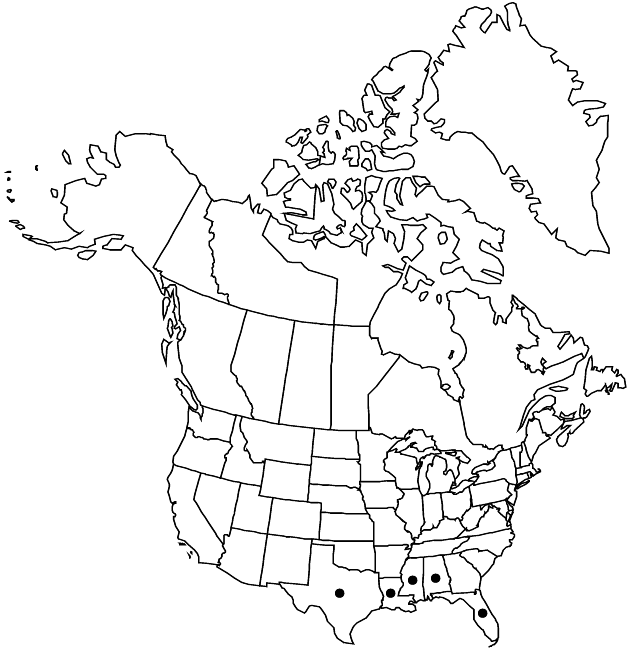Thymophylla tenuiloba var. tenuiloba
Common names: Dahlberg daisy golden fleece
Treatment appears in FNA Volume 21. Treatment on page 243.
Revision as of 22:34, 29 July 2020 by imported>Volume Importer
Leaves 7–15-lobed. Pappi of 10–12, 3–5-aristate scales 2–3.5 mm. 2n = 16, 24, 32, 40.
Phenology: Flowering early spring–late fall.
Habitat: Heavy soils or loams or sands, often with limestone, frequently ruderal along roadways and in other disturbed places
Elevation: 0–300 m
Distribution

Tex., Mexico (Tamaulipas), in West Indies, Asia, Africa
Discussion
Variety tenuiloba is relatively recently adventive in Alabama, Florida, Louisiana, Mississippi, Bahamas, West Indies (Cuba), Asia, and Africa.
The names Dahlberg daisy and golden fleece are recent coinages applied to cultivars of var. tenuiloba in the horticultural trade.
Selected References
None.
Lower Taxa
None.
... more about "Thymophylla tenuiloba var. tenuiloba"
introrse +
connate +
herbaceous +
scarious +
absent +
hirsute +
papillate +
continuous +
decurrent +
lobed +
winged;ribbed;winged;ribbed +
0;1/2 +
deltate;subulate +
stigmatic +
20;50 +
absent +
zygomorphic +
monomorphic +
dimorphic +
2mm;3.5mm +
staminate +
straight +
distinct +
proximal +
1;5 +
bisexual +
dispersed +
cylindric +
singly +
Heavy soils or loams or sands, often with limestone, frequently ruderal along roadways and in other disturbed places +
discoid +
indeterminate +
surrounding +
obconic +
4mm;10mm +
1.5mm;3mm +
alternate +
cauline +
7-15-lobed +
pliable +
distinct +
2-carpellate +
inferior +
attached +
anatropous +
persistent +
falling +
absent +
tough +
thick +
absent +
connate +
persistent +
distinct +
falling +
unequal +
Fl. S.E. U.S., +
1903 +
pistillate +
absent +
fertile +
epaleate +
convex +
fibrous +
distinct +
10-12,3-5-aristate +
exalbuminous +
modifed +
1;2 +
alternate +
branched +
2-branched +
papillate +
Thymophylla tenuiloba var. tenuiloba +
Thymophylla tenuiloba +
variety +
cylindric +
shorter +
much longer +
annual +